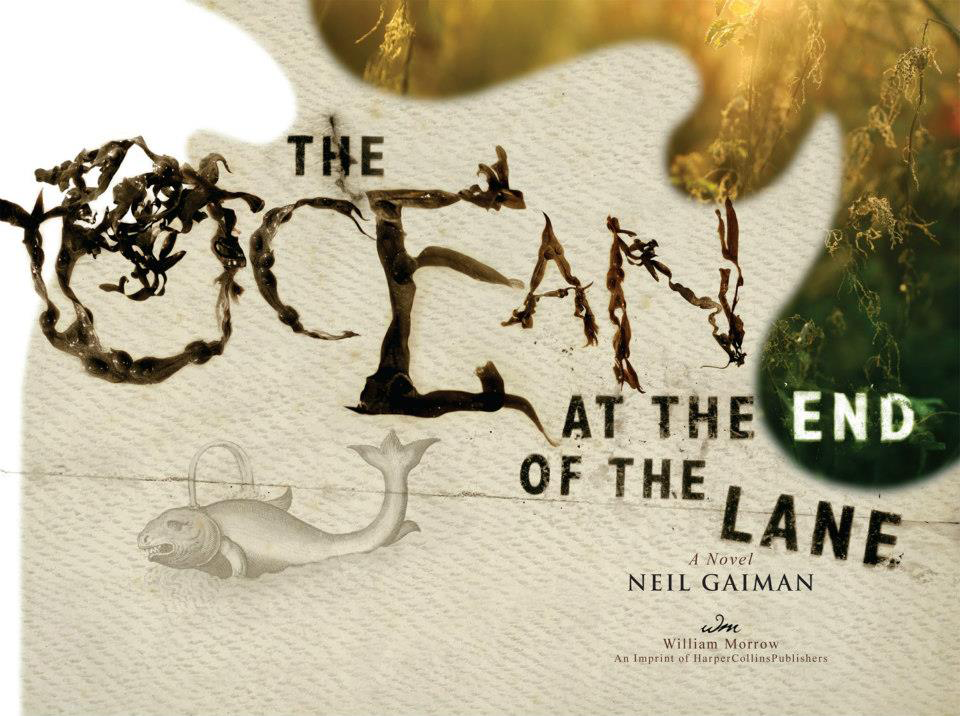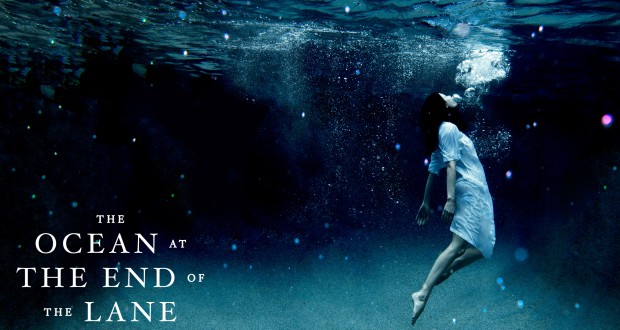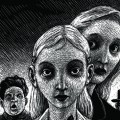*Spoiler free review*
I’m only a recent convert to the Neil Gaiman way of life, but when I saw his most recent novel, Ocean at the End of the Lane, on sale for £0.99 for the Kindle, I couldn’t buy with one-click fast enough! The novel has had almost universally excellent reviews and won the National Book Award for Book of the Year 2013 (as well as Audiobook of the Year). And does it deserve such high praise? On the whole, yes, I’d say it does. It isn’t perfect, but it is addictive and intriguing.
Plot
 Our unnamed protagonist is back in his hometown for a funeral. He visits the home of an old friend. While there, he begins to remember a peculiar set of events from his childhood – a tale he can only seem to remember while in the presence of the strange pond on the Hempstocks’ property.
Our unnamed protagonist is back in his hometown for a funeral. He visits the home of an old friend. While there, he begins to remember a peculiar set of events from his childhood – a tale he can only seem to remember while in the presence of the strange pond on the Hempstocks’ property.
When he was a child, his parents lost their financial stability and they had to begin taking in lodgers. When one lodger arrived, the opal miner, everything began to change. Soon our protagonist is pulled into a world where ponds can be oceans, all knowledge can be learned in a second and forgotten just as quickly, people can travel between worlds within other people, and monsters can worm their way into your home without anyone else noticing anything is wrong. This is a truly terrifying place for a child, and the protagonist latches on to his newfound friendship with Lettie Hempstock.
With the help of Lettie, Ginnie, and Old Mrs Hempstock, he must defeat the monstrous Ursula Monkton and save himself.
‘Books were safer than other people anyway.’
Ocean at the End of the Lane is both fantasy and horror – it could easily be the product of a child’s imagination. Equally, we believe it is something that could have happened to this particular child. And the book points out this curiosity to us, as Old Mrs Hempstock mentions on several occasions that no two people will remember the same event in the same way. Did it really happen that way? You can never really know.
The story is also a kind of parable for a child dealing with grief. First his cat is killed by the opal miner, then the opal miner commits suicide. Meanwhile, his parents have lost their money and their marriage is not solid. It makes sense for a child to need a supernatural explanation for such awful events. Why would any seven year old want to believe that life is really just that hard/shit/unfair? They wouldn’t. But they might just believe that an evil ‘spirit’ of some description has been loosed on their world by accident.
The reader also never gets a real explanation of the ‘other’ world or who the Hempstocks really are. This just adds to the mystery. Is this a child’s invented story, precariously teetering between reality and fantasy? Or did our protagonist never get the information, therefore the reader never can? It leaves us questioning and helps drive us forward. Luckily the lack of pay-off when it comes to other worldly details doesn’t diminish enjoyment of the story.
‘Words save our lives, sometimes.’
 While on the whole the novel is exciting, interesting, and fun, it is definitely not perfect. Gaiman has a tendency to flick between narrative voices in a jarring manner – we aren’t sure whether it is the child narrating or the adult. Perhaps this was deliberate, but I didn’t feel like it worked. I wanted him to stick to one or another – preferably the child’s voice. But occasionally large words stuck out like sore thumbs before being transported back into the child’s story, through the child’s eyes.
While on the whole the novel is exciting, interesting, and fun, it is definitely not perfect. Gaiman has a tendency to flick between narrative voices in a jarring manner – we aren’t sure whether it is the child narrating or the adult. Perhaps this was deliberate, but I didn’t feel like it worked. I wanted him to stick to one or another – preferably the child’s voice. But occasionally large words stuck out like sore thumbs before being transported back into the child’s story, through the child’s eyes.
Also, I found it frustrating that the very nature of the story meant that not only did the protagonist not learn from the experience, he never could. Since he would never remember what really happened when he left the Ocean, he could never keep the lessons learned in his mind. So the entire story seemed pointless. I wonder whether the framing of the narrative with the older version of the protagonist was really necessary, and if perhaps it actually detracted from the rest of the story.
Verdict: A great read. Fun, interesting, full of monsters and horrors. If you’re a fan of imagination, you will be a fan of Ocean at the End of the Lane.
 Pop Verse Pop Culture Universe
Pop Verse Pop Culture Universe






